Term Page
Post-Conviction Relief 
Across the country, states and localities are increasingly moving to end marijuana prohibition laws. For immigrant communities, despite the changing attitude toward marijuana-related conduct at the state level, an old conviction can still form the basis for immigration-related consequences at the federal level. Though federal legal reforms may be the only way to completely eradicate the immigration consequences of marijuana-related conduct and convictions, reforms at the state level can nevertheless help stop the arrest-to-deportation pipeline. Drawing from our experience with state and municipal efforts across the country, this resource, jointly produced by the Immigrant Legal Resource Center, the Immigrant Defense Project, and the Drug Policy Alliance, lists best practices for municipalities and states looking to decriminalize in a way that lessens the immigration-related harms of marijuana criminalization.
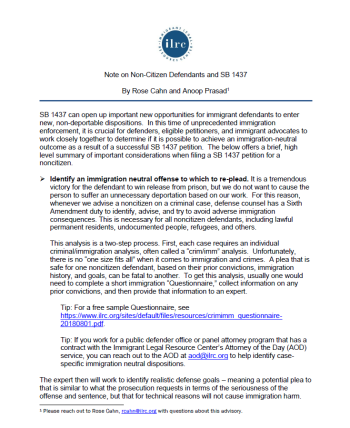
This brief advisory written by Rose Cahn, ILRC and Anoop Prasad, Asian Americans Advancing Justice Asian Law Caucus, discusses how petitions for relief using PC 1437, the reform to the felony murder rule, can be helpful to immigrants seeking to mitigate immigration consequences.

A one-page issue spotting decision tree to help screen for potential forms of post-conviction relief. For an in-depth discussion of any of these vehicles, see this guide, created by the ILRC and Californians for Safety and Justice.
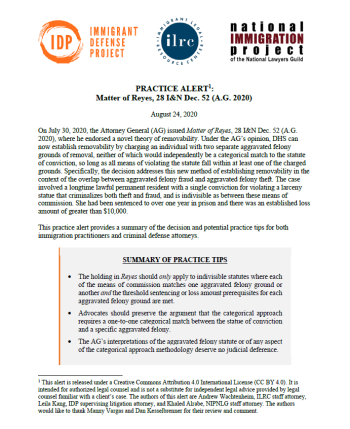
On July 30, 2020, Attorney General Barr issued Matter of Reyes, 28 I&N Dec. 52 (A.G. 2020), a case involving a longtime lawful permanent resident with a single conviction for violating a larceny statute that criminalizes both theft and fraud, and is indivisible as between these means of commission. She had been sentenced to over one year in prison and there was an established loss amount of greater than $10,000. This practice alert provides a summary of the decision and potential practice tips for both immigration practitioners and criminal defense attorneys representing noncitizens in criminal and immigration cases. These tips focus on challenging the correctness of the AG's new theory of removability, challenging any judicial deference to the AG's opinion, fighting DHS efforts to file new NTAs or motions to reopen past proceedings, contesting retroactive application of the new decision, and criminal defense strategies for avoiding its reach in advising noncitizens on resolving open criminal matters.
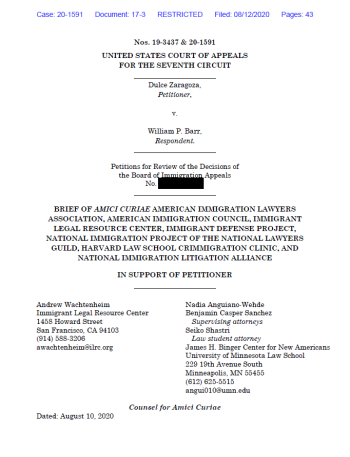
In October 2019, Attorney General Barr issued Matter of Thomas & Matter of Thompson, altering the standard for when immigration law will recognize a criminal sentencing modification. Since then, government attorneys from ICE and adjudicators from DHS and DOJ have misused and exploited the decision to incorrectly impose immigration consequences on vacated and modified past convictions and sentences. Immigrant rights advocates have pushed back by attacking this decision in the federal courts. In this amicus brief submitted to the Seventh Circuit Court of Appeals, immigration law experts directly challenge the AG's decision, arguing it is incorrect as a matter of law, is not entitled to any level of deference, and if permitted to stand cannot be applied retroactively. These arguments build on a growing body of case law refusing to offer deference to the DOJ on interpretation of immigration provisions that have both civil and criminal application. E.g., Valenzuela Gallardo v. Barr, --- F.3d ---, 2020 WL 4519085 (9th Cir. Aug. 6, 2020). Advocates challenging Thomas/Thompson in agency and court proceedings can use the arguments in this brief to attack the case on the merits and to resist its retroactive application.
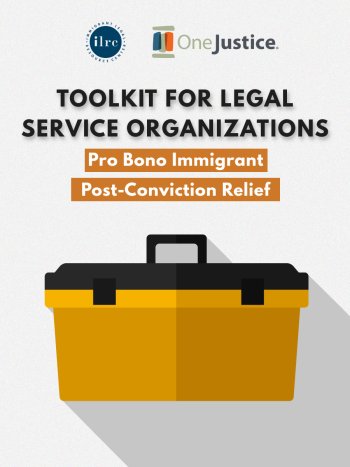
This toolkit is designed for legal service organizations who want to engage pro bono attorneys in providing immigrant post-conviction relief screening and services. It contains tools to run a legal clinic to screen for crim/imm issues and post-conviction relief options, tools to perform case-specific legal analysis for noncitizens with prior convictions, and tools to place and supervise post-conviction relief motions with pro bono attorneys. Although this toolkit was designed with pro bono engagement in mind, many tools may also be useful to organizations expanding their own immigrant post-conviction relief practice.
This toolkit will help reentry service providers expand services for noncitizens impacted by the criminal legal system. It offers an escalating service menu, starting with tools to provide general information about how a conviction can impact immigration status, advancing to tools to help clients gather information necessary for an individualized legal analysis, tools to perform that analysis, and last, tools to pursue immigration-related post-conviction relief. This toolkit was designed with reentry providers in mind, but may also be useful for immigration legal providers serving clients with prior records.
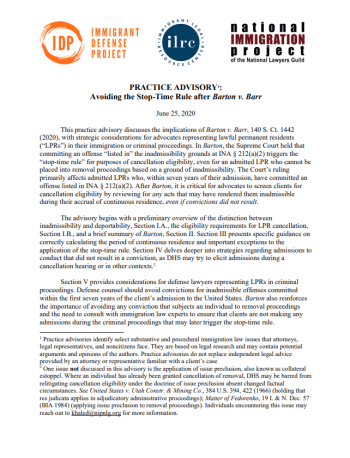
This Practice Advisory is a detailed follow-up to our prior Practice Alert on the Supreme Court's April 23, 2020 decision in Barton v. Barr, 140 S. Ct. 1442 (2020). In Barton, the Court held that committing an offense “listed in” the inadmissibility grounds at INA § 212(a)(2) triggers the "stop-time" rule for purposes of cancellation of removal eligibility, even for an admitted LPR who cannot be charged as removable under the inadmissibility grounds. This Advisory provides an in-depth discussion of the Barton decision, focusing on legal arguments to push back against overreaching DHS efforts seeking to trigger the stop-time rule, legal arguments and trial strategies to prevent conduct that did not result in conviction from triggering the stop-time rule, and considerations for criminal defense lawyers representing immigrants in criminal proceedings.
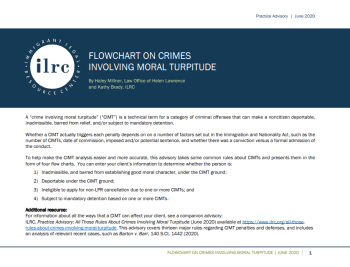
Penalties for crimes involving moral turpitude (CIMTs) are based on several factors, such as the number of CIMTs, date of commission, imposed and/or potential sentence, and whether there was a conviction versus admission of the conduct. The result is that determining whether a CIMT penalty actually applies can be quite complex. This set of four flow charts can be used to answer four questions about a case: is the particular person deportable; inadmissible or barred from establishing good moral character; barred from applying for non-LPR cancelation; or subject to mandatory detention, based on CIMTs?

On June 5, 2020, the California Court of Appeals, Second Appellate District, published People v. Ruiz, holding that the defendant could vacate her conviction because she was not advised that her conviction will carry deportation consequences. Rose Cahn, Mike Mehr, and appellant’s counsel, filed the above letter with the Court of Appeal, suggesting clarification that defense counsel bears the duty to advise about specific immigration consequences, and distinguishing from the court’s more general obligation to advise about potential immigration consequences.